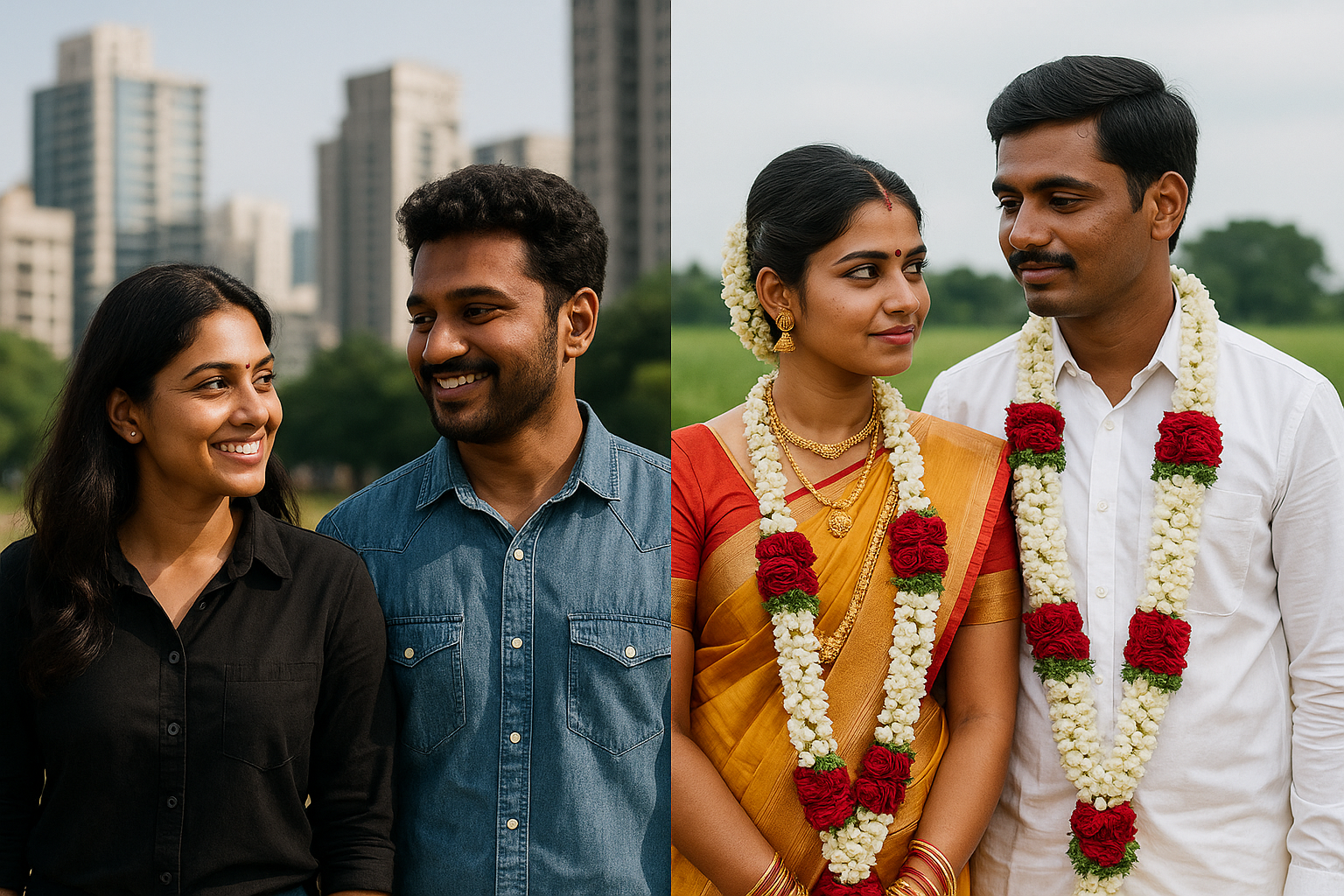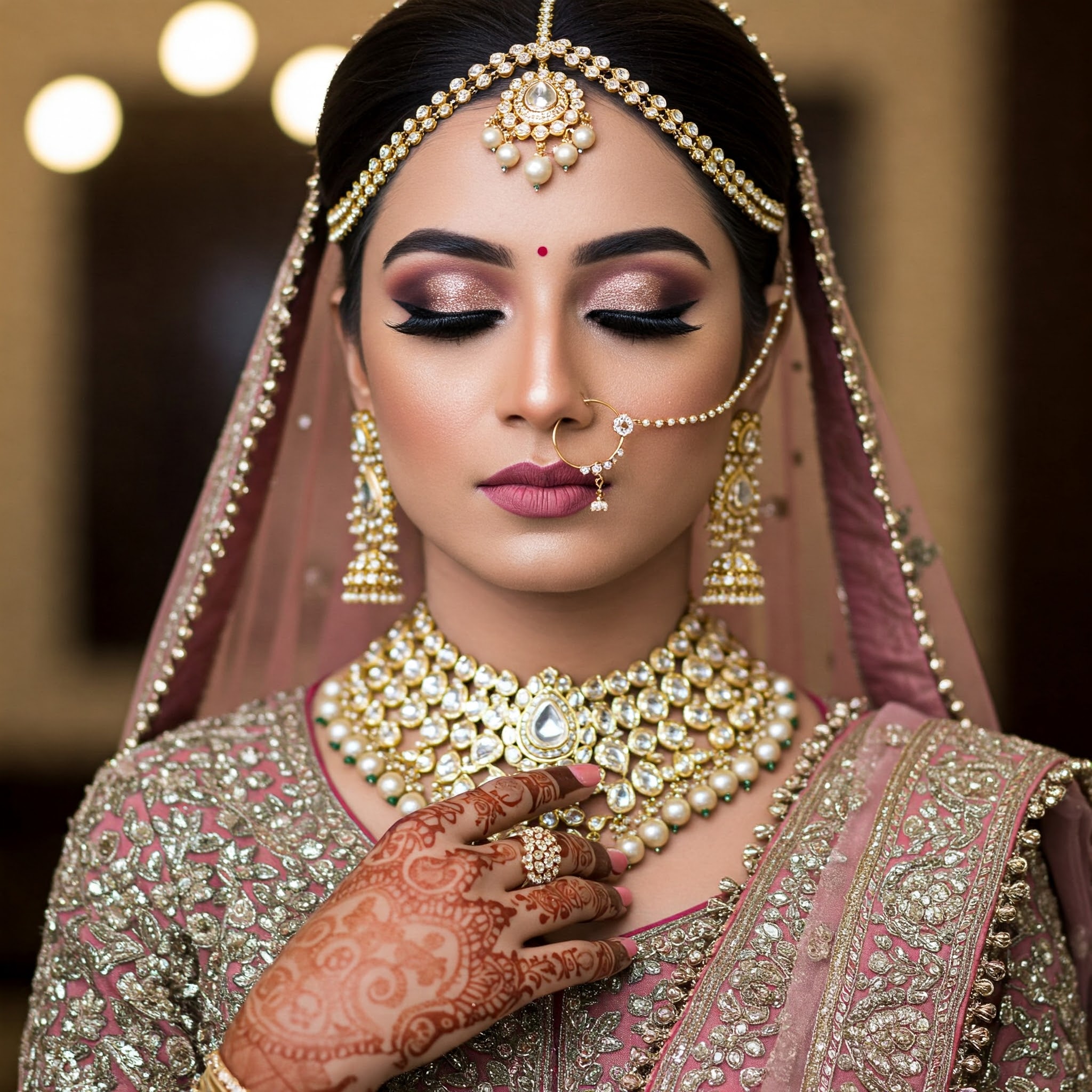
How Urban vs. Rural Tamils Approach Matrimony Differently
26-May-2025 DigiShaadi
Introduction
Matrimony in Tamil culture is deeply rooted in tradition, yet it is not immune to the changing tides of modernity. Whether in the bustling lanes of Chennai or the quiet villages of Thanjavur, marriage remains a revered institution. However, the way Tamils approach this life milestone can differ vastly based on geography. In this blog, we explore the contrasts between urban and rural Tamil communities in their matrimonial choices—from matchmaking methods and partner expectations to rituals and family involvement.
This article offers deep insights into the evolving trends while staying connected to our cultural core. For a broader overview of the Tamil matrimonial ecosystem, you may want to start with our pillar blog on Tamil Matrimony Online.
Matchmaking Platforms: Matrimonial Sites vs. Word-of-Mouth
Urban Tamil Approach:
Urban Tamils, especially those in metros like Chennai, Coimbatore, and Madurai, increasingly rely on online matrimony platforms. Sites like DigiShaadi provide advanced filters based on education, profession, and lifestyle, empowering individuals to find matches that align with their personal and professional aspirations.
For tips on creating an impressive profile, check our blog on How to Find Your Perfect Tamil Life Partner.
Rural Tamil Approach:
In contrast, rural communities often rely on traditional channels—word-of-mouth, family priests, or local marriage brokers. There's still great trust in astrology and community elders to guide matrimonial decisions. While the digital wave has started penetrating villages, acceptance remains gradual.
Role of Family in Matchmaking
Urban Settings:
In urban areas, families are supportive but tend to give more space to the bride or groom in decision-making. It's not uncommon for the couple to speak over calls or even meet in cafes before formalising things.
Rural Settings:
In rural Tamil Nadu, arranged marriages are still prevalent. The bride and groom may have limited direct interaction before marriage, and elders, especially fathers or uncles, take the lead in screening matches. Respect for hierarchical family structures plays a crucial role.
Caste and Subcaste Considerations
Caste preferences continue to influence both urban and rural matrimony, though the degree varies.
Urban Tamils might lean toward compatibility in education or values, but caste still plays a role—especially for parental approval.
-
Rural Tamils often insist on intra-caste and even intra-subcaste matches.
Learn more about this sensitive topic in our blog on Caste and Subcaste Preferences in Tamil Matrimony.
Educational and Career Preferences
Urban Preferences:
Higher education and financial independence are highly valued. Many urban grooms look for professionally accomplished brides and vice versa. Preferences may include doctors, engineers, IT professionals, or government servants.
Rural Preferences:
While education is appreciated, job location and the ability to adapt to family life often take precedence. Brides working in nearby towns or with transferable jobs (like teachers or nurses) are considered ideal.
Wedding Rituals and Celebrations
Urban Weddings:
Urban Tamil weddings are often a fusion of tradition and convenience. While key rituals like Nichayathartham, Kashi Yatra, and Mangalya Dharanam are performed, some customs are abbreviated due to time or cost constraints. Destination weddings and modern photography trends are gaining popularity.
Read more about these rituals in our blog: Top Tamil Wedding Rituals You Must Know Before Marriage
Rural Weddings:
Rural weddings tend to be more elaborate and rooted in tradition. Every ritual—from Naandi Shraddham to Kanyadaanam—is meticulously followed. These ceremonies are deeply community-orientated and often involve the entire village.
Astrology and Horoscope Matching
Urban Outlook:
While still important, astrology is sometimes seen as optional. Many urban Tamils consider personality compatibility, lifestyle alignment, and emotional connection equally, if not more, critical.
Rural Outlook:
Horoscope matching is non-negotiable. A mismatch in "dosham" or planetary alignment often leads to rejection, regardless of other compatibilities.
Age of Marriage
Urban Trends:
The average age of marriage is rising. Urban men and women often marry in their late 20s or early 30s, after completing education and establishing careers.
Rural Trends:
Early marriage is still common, especially for women. Social and economic factors, along with traditional beliefs, influence this trend.
Gender Roles and Expectations
In Cities:
Women are expected to be equal partners. Many urban households are dual-income, and men contribute to household duties. Expectations are shifting toward more liberal ideologies.
In Villages:
Traditional gender roles are often maintained. Men are seen as providers and women as homemakers, although this is gradually changing with the rise in women’s education.
Post-Marriage Living Arrangements
Urban Couples: Often live separately from extended family, especially if they’re working in a different city or abroad.
-
Rural Couples: Typically live in joint families, with clear expectations about supporting elders and preserving family traditions.
Cross-Cultural and Inter-Caste Marriages
Urban areas are more receptive to inter-caste and inter-community marriages, especially if the families are well-educated or cosmopolitan. However, rural communities still hold tight to endogamous practices.
Influence of Diaspora and NRI Trends
Urban Tamil families with relatives abroad often explore NRI matches. Exposure to global lifestyles and education systems shapes matrimonial expectations.
In rural areas, marrying someone settled abroad is considered prestigious, though the vetting process is more cautious due to trust concerns.
Digital Literacy and Matrimony
Urban families use matrimony apps, video calls, and AI-based matchmaking.
-
Rural families are beginning to embrace mobile platforms but often depend on younger family members for navigation and communication.
Financial Transactions and Dowry
While both urban and rural societies are trying to move away from dowry, it’s still a factor—more so in rural settings. Urban matches may prioritise financial stability and shared goals over material exchange.
Wedding Planning: Professionals vs. Community Help
Urban weddings often involve wedding planners, decorators, and stylists. There’s a strong focus on social media visibility.
Rural weddings depend more on local resources, community kitchens, and extended family support, making the event more communal.
Evolving Attitudes Toward Love Marriages
Urban Tamil society is increasingly open to love marriages, especially among younger generations. Rural regions still view them with scepticism, often requiring family negotiations and community acceptance.
Language and Communication Style
Urban Tamils are often bilingual or multilingual, incorporating English into conversations. This affects how matrimonial profiles are written and how families communicate.
Rural Tamils primarily use their native dialects and prefer verbal interactions or handwritten proposals.
Emphasis on Compatibility vs. Conformity
Urban settings prioritise individual compatibility—shared values, hobbies, and emotional understanding.
Rural matches focus more on conformity to community values and family traditions.
Role of Elders in Married Life
In villages, in-laws and elders often have strong influence over the couple’s life decisions. In cities, boundaries are more defined, and couples have greater autonomy.
Attitudes Toward Divorce and Second Marriage
Despite their differences, both urban and rural Tamil communities share a commitment to preserving core cultural values. Whether it’s through rituals, food, or family ties, Tamil matrimony remains a meaningful and sacred institution.
Final Thoughts
The divide between urban and rural Tamil matrimonial practices is not just geographic—it reflects differences in values, exposure, and adaptability. However, both spheres are evolving, influenced by technology, education, and changing aspirations.
For those seeking meaningful connections while respecting tradition, platforms like DigiShaadi bridge the gap—offering tools that cater to every Tamil individual, regardless of where they live.
Explore more:




